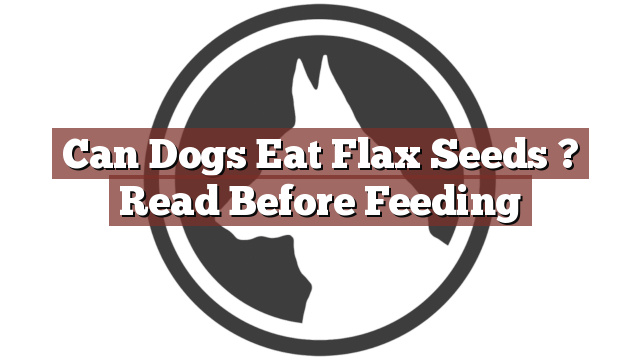Understanding Your Dog’s Dietary Needs
As responsible pet owners, it is crucial to understand our dogs’ dietary needs to ensure their optimal health and well-being. Providing a balanced and nutritious diet is essential for their overall growth and development. While it is tempting to share our food with our furry friends, not all human foods are safe for them. It is important to be informed about what dogs can and cannot eat to avoid any potential health risks.
Can Dogs Eat Flax Seeds? Read Before Feeding
Can dogs eat flax seeds? This is a common question among dog owners who are looking for ways to supplement their pets’ diets with healthy ingredients. Flax seeds are tiny powerhouses packed with nutrients such as omega-3 fatty acids, fiber, and lignans. These nutrients have various health benefits for humans, but can they be beneficial for dogs too? The answer is yes, dogs can eat flax seeds, but it is important to do so in moderation.
Pros and Cons of Feeding Flax Seeds to Dogs
There are several potential benefits of feeding flax seeds to dogs. The omega-3 fatty acids found in flax seeds can promote healthy skin and coat, reduce inflammation, and support heart health. Flax seeds are also a good source of fiber, which can aid in digestion and promote regular bowel movements in dogs. Additionally, the lignans present in flax seeds have been associated with potential anticancer properties.
However, it is essential to note that flax seeds should be introduced gradually and in small quantities. Too much flax seed consumption can lead to digestive issues such as diarrhea or constipation. It is also important to ensure that flax seeds are ground or crushed before feeding them to your dog, as whole flax seeds may pass through undigested, providing little to no nutritional benefit.
In Conclusion: Weighing the Benefits and Risks of Flax Seeds for Dogs
In conclusion, flax seeds can be a healthy addition to your dog’s diet when fed in moderation and prepared properly. The omega-3 fatty acids, fiber, and lignans found in flax seeds offer potential health benefits for dogs. However, it is crucial to consult with your veterinarian before introducing any new food into your dog’s diet, including flax seeds.
Remember, each dog is unique and may have individual dietary requirements. Your vet can provide personalized advice based on your dog’s specific needs and health conditions. By understanding your dog’s dietary needs and being cautious about the foods you offer, you can ensure that your furry companion stays healthy and happy for years to come.
Thank you for taking the time to read through our exploration of [page_title]. As every dog lover knows, our furry friends have unique dietary needs and responses, often varying from one canine to another. This is why it's paramount to approach any changes in their diet with caution and knowledge.
Before introducing any new treats or making alterations to your dog's diet based on our insights, it's crucial to consult with a veterinarian about [page_title]. Their expertise ensures that the choices you make are well-suited to your particular pet's health and well-being.
Even seemingly harmless foods can sometimes lead to allergic reactions or digestive issues, which is why monitoring your dog after introducing any new food item is essential.
The content provided here on [page_title] is crafted with care, thorough research, and a genuine love for dogs. Nevertheless, it serves as a general guideline and should not be considered a substitute for professional veterinary advice.
Always prioritize the expert insights of your veterinarian, and remember that the health and happiness of your furry companion come first.
May your journey with your pet continue to be filled with joy, love, and safe culinary adventures. Happy reading, and even happier snacking for your canine friend!

